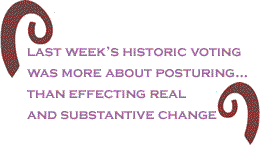Last week, with a
vote of 230 to 191, the House of Representatives passed
the repeal of former President Bill Clinton�s 1993 �Don�t
Ask, Don�t Tell (DADT)� policy that bars lesbian, gay, bisexual,
transgender, and queer (LGBTQ) service members from the
military. On the same day the House passed to repeal DADT,
so too did the Senate Armed Services Committee.
�This legislation will
help make our armed forces even stronger and more inclusive
by allowing gay and lesbian soldiers to serve honestly and
with integrity,� President Obama told the Associated Press.
But at the end of the
day of all this historic voting, the plight of our LGBTQ
service members remained unchanged.

Investigations and discharges
for being an openly LGBTQ service member will continue on
as usual. Why? Because the Pentagon has not completed its
study, reviewing how to maintain the military�s �unit cohesion�
while integrating LGBTQ service members.
December 1 is the day
the country will know the results of the Pentagon study.
We will also know if the welcoming mat will really begin
to unfold for our LGBTQ service members.
So, with the military
having the real power to either overturn or to uphold DADT,
what was last week�s voting in the House and the Senate
Armed Services Committee really about?
Pressure? Posturing?
Or, both?
�While the power to
actually overturn don�t ask, don�t tell remains with military
commanders many see a congressional vote before the report
is completed as political pressure,� writes W. James Antle
III at the American Conservative.
And the pressure comes
from both conservatives and the LGBTQ activist community.
 Polls
have revealed that where the country was in 1993 with DADT
is vastly different from where the country is today. As
a matter of fact, most Americans - even Republicans - are
not adverse to the military having LGBTQ service members. Polls
have revealed that where the country was in 1993 with DADT
is vastly different from where the country is today. As
a matter of fact, most Americans - even Republicans - are
not adverse to the military having LGBTQ service members.
But with midterm elections
just five months away and with a Republican anti-Obama movement
aggressively trying to retake Congress, the chances of repealing
DADT becomes slimmer.
In last week�s House
vote, 168 Republicans opposed repealing DADT and only 5
Republicans voted with the Democratic House majority.
For many in the LGBTQ
community, we are anxious about the repeal of DADT coming
to fruition, and feel that last week�s historic voting was
more about posturing from the President and his administration
than effecting real and substantive change on our behalf.
�For the two of us -
and many more who have been working for the repeal of this
legislation for months and years - this effort is simply
a way for Congress, the White House, and the Pentagon to
shift responsibility to one another indefinitely,� Cpl.
Evelyn Thomas, and Lt. Dan Choi wrote in an open letter.
And shifting responsibility
on repealing DADT is what the Obama administration has been
doing since the President took office.
For example, soon after
Obama�s inauguration in 2009, the LGBTQ community waited
anxiously to hear that steps were being made to repeal DADT.
 But
on June 8 of that year, when the Supreme Court refused to
review the Pentagon policy that prohibits LGBTQ service
members to serve openly in the military, Obama�s people
added salt to the wounds of our LGBTQ service members by
stating in court papers that the ruling on DADT was correct
because of the military�s legitimate concern of LGBTQ service
members endangering �unit cohesion� - a concept totally
debunked by a 2002 study. But
on June 8 of that year, when the Supreme Court refused to
review the Pentagon policy that prohibits LGBTQ service
members to serve openly in the military, Obama�s people
added salt to the wounds of our LGBTQ service members by
stating in court papers that the ruling on DADT was correct
because of the military�s legitimate concern of LGBTQ service
members endangering �unit cohesion� - a concept totally
debunked by a 2002 study.
While the Obama administration
shifts responsibility on repealing DADT, Lt. Dan Choi and
Capt. James Pietrangelo have begun a Dignity Fast, bringing
focus to last week�s compromised vote that still maintains
DADT rather than totally doing away with it.
�In response to the
United States Senate and the House of Representatives voting
on the repeal of Don�t Ask Don�t Tell, forces are mobilizing
for non-violent direct action and civil disobedience. Veterans
are ready to spend Memorial Weekend in prison. Fasting will
also commence. The simple demands are (1) End DADT firings.
(2) Enact non-discrimination. (3) End the insulting, wasteful
study. The community knows that the President does have
within his power to end the discharges immediately. The
President has not responded authentically in ending the
firings and inherent discrimination,� Choi wrote.
To date, more than 13,500
LGBTQ service members have been discharged under DADT, and
the number continues to grow. And African American lesbians
have been discharged at a much higher rate than other groups.
The posturing last week
from Congress was great theater. All the thespians performed
their parts well, especially Obama. Why? If DADT is not
repealed, then it gives the President an easy out. It allows
the President to distance himself politically by shifting
the responsibility and blame for DADT�s outcome from himself
to someone else.
BlackCommentator.com
Editorial Board member, the Rev. Irene Monroe, is a religion
columnist, theologian, and public speaker. She is the Coordinator of the African-American
Roundtable of the Center for Lesbian and
Gay Studies in Religion and Ministry (CLGS) at the Pacific
School of Religion.
A native of Brooklyn,
Rev. Monroe is a graduate from Wellesley College and Union
Theological Seminary at Columbia University, and served
as a pastor at an African-American church before coming
to Harvard Divinity School for her doctorate as a Ford Fellow.
She was recently named to MSNBC�s list of 10 Black Women You Should Know. Reverend Monroe is the author of Let Your Light Shine Like a Rainbow Always: Meditations on Bible Prayers for Not�So�Everyday Moments. As an
African-American feminist theologian, she speaks for a sector
of society that is frequently invisible. Her website is
irenemonroe.com.
Click here
to contact the Rev. Monroe.

|

